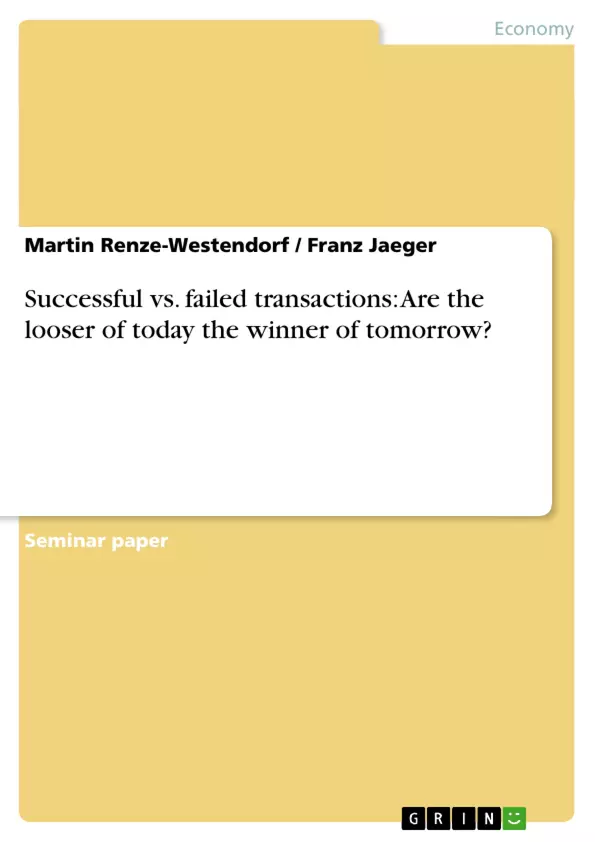If the market for mergers and acquisitions is observed over the last few decades, it is quite impressive by what amounts the number and dollar volume of takeovers have increased year by year.1 Although the rapid development has ceased over the past years, it is evident that mergers and acquisitions still play an important role in shaping the business landscape. In contrast, however, the benefits which are supposed to be generated by those takeovers are not that obvious. The topic of takeovers which turn out to be negative for shareholders is common and widely discussed in the financial business press. In spite of this fact, it is far less known what actually happens later on to those companies that realize one or more of these ‘bad’ acquisitions.
Observing these underperforming companies over time, it is disclosed that many of these ‘losers’ become takeover targets themselves afterwards.2 Hence, it seems to be the case that the takeover of the value destructing company is related to or a consequence of the previously made transactions. If that holds true, then it could be the case that the takeover market serves as a means to discipline inefficient managers for their underperformance.
[...]
1 See Appendix I.
2 This assumption will be discussed more thoroughly in section 3.2. It relates to findings of the field study that was carried out by Mitchell and Lehn. See MITCHELL/LEHN (1990), p. 37.
Inhaltsverzeichnis (Table of Contents)
- LIST OF ABBREVIATIONS
- INTRODUCTION
- Problem definition and objectives
- Course of analysis
- BASIC TERMINOLOGY
- Definition: The market for corporate control
- Definition: Successful and unsuccessful transactions
- ANALYSIS OF RESEARCH UP-TO-DATE
- Reasons for value-enhancing takeovers
- Motivations and forces that discipline managers
- The realization of restructuring measures due to takeovers
- The realization of restructuring measures due to takeover threats
- The realization of restructuring measures due to other control mechanisms
- Critical review of empirical evidence
- CASE STUDY BANKERS TRUST AND DEUTSCHE BANK
- Facts and Background Information
- Bankers Trust's acquisitions
- Deutsche Bank - Bankers Trust Deal
- Analysis of Stock Price Performance
- Case Study Methodology
- Stock price performances
- Reasons for observed results
- Case Study Results versus Academic Research
- Facts and Background Information
- CONCLUSION
- TABLE OF APPENDICES
- BIBLIOGRAPHY
Zielsetzung und Themenschwerpunkte (Objectives and Key Themes)
This paper aims to investigate the disciplinary role of the takeover market in relation to firms that undertake value-diminishing transactions. Specifically, it seeks to determine whether the takeover market can help discipline managers of such firms and whether previously destructed value can be regained afterwards. The analysis focuses on providing a better understanding of the functions of the takeover market and offering insights for company managers, directors, shareholders, and government regimes.
- The disciplinary function of the takeover market
- The role of takeovers in value destruction and recovery
- The impact of takeovers on managerial behavior
- The effectiveness of takeover threats as a disciplinary mechanism
- The influence of alternative control mechanisms on managerial decisions
Zusammenfassung der Kapitel (Chapter Summaries)
- Introduction: Introduces the problem of value-diminishing transactions and the potential role of the takeover market in disciplining managers. Defines the research objectives.
- Basic Terminology: Defines key terms related to the market for corporate control, including the concept of value-diminishing transactions and successful and unsuccessful takeovers.
- Analysis of Research Up-to-Date: Presents existing theories on how takeovers can discipline managers who have made value-diminishing transactions. Examines the empirical evidence supporting these theories, focusing on the effectiveness of takeovers, takeover threats, and other control mechanisms.
- Case Study Bankers Trust and Deutsche Bank: Analyzes the 1998 Deutsche Bank - Bankers Trust takeover to illustrate the consequences of mismanagement and the potential for takeover-driven restructuring. Provides a detailed analysis of stock performance and background information.
Schlüsselwörter (Keywords)
This paper explores the relationship between the takeover market and corporate governance, specifically focusing on the disciplinary role of takeovers in addressing value-diminishing transactions. Key concepts include mergers and acquisitions, managerial incentives, corporate control, value creation and destruction, takeover threats, and restructuring measures. The paper utilizes empirical evidence and a case study to analyze the impact of takeovers on firm performance and the effectiveness of the takeover market as a control mechanism.
- Citation du texte
- Martin Renze-Westendorf (Auteur), Franz Jaeger (Auteur), 2005, Successful vs. failed transactions: Are the looser of today the winner of tomorrow? , Munich, GRIN Verlag, https://www.grin.com/document/58646



